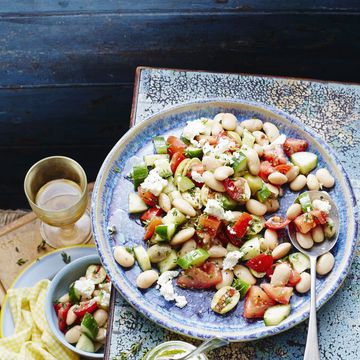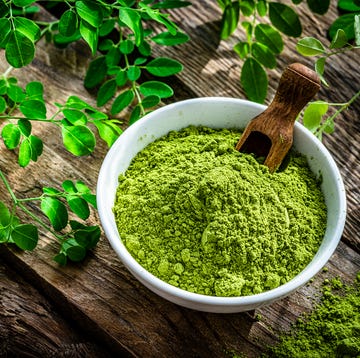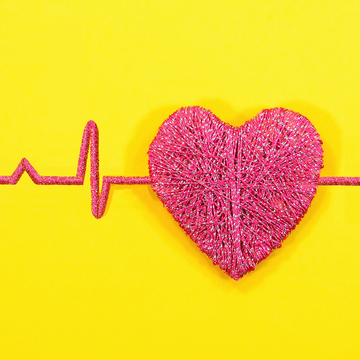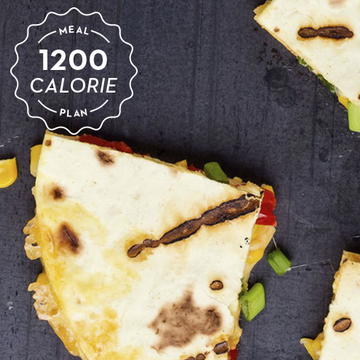1Leafy greens
 Jurgita Vaicikeviciene / EyeEm//Getty Images
Jurgita Vaicikeviciene / EyeEm//Getty Images“Leafy greens, such as spinach, romaine, kale and collard greens, are a good source of antioxidants which help protect the body against free radicals,” Gans says. Free radicals are atoms that damage cells and are impossible to escape; they’re in air pollution, chemicals and even the sun’s UV rays. Over time, exposure to free radicals can damage the body’s cells, which can negatively impact health. Consider antioxidant-rich foods, like leafy greens, a protective shield. “Dark leafy greens especially provide bone-promoting calcium and heart-healthy folate,” Gans adds, naming two other health benefits of this low-carb food.
2Broccoli
 Getty Images
Getty ImagesAnother low-carb vegetable that supports the immune system is broccoli. “A cup of broccoli contains even more vitamin C than an orange,” Sassos says. Pretty impressive, right? She also says that broccoli contains lutein and zeaxanthin, which are key for eye health. That’s not all, either. Gans adds that broccoli contains vitamins E and K, both of which help protect against chronic illness and disease.
Advertisement - Continue Reading Below
3Zucchini
 Alina Indienko//Getty Images
Alina Indienko//Getty ImagesThere’s a reason why spiralized zucchini has become a popular way to cut down on carbs in place of traditional pasta; a medium zucchini only has six grams of carbohydrates. “Zucchini noodles make a great swap for spaghetti and lasagna in many recipes, helping to keep blood sugar levels at bay,” Sassos says. Gans adds that the squash is a good source of fiber, which promotes digestive health, and also contains vitamin C, which supports the immune system.
4Cauliflower
 Andrey Elkin
Andrey ElkinA cousin of sorts to broccoli, cauliflower boasts just as many nutritional benefits without majorly upping the carb content in your meal. Like broccoli, Gans says that cauliflower has vitamins C, E and K. In fact, one serving of cauliflower has the entire daily recommended amount of vitamin C.
Advertisement - Continue Reading Below
5Green beans
 Anastasiia Yanishevska//Getty Images
Anastasiia Yanishevska//Getty Images 6Mushrooms
 the_burtons//Getty Images
the_burtons//Getty ImagesMushrooms really are magic — even if they’re just of the shiitake, button and portobello variety. “Many mushrooms contain vitamin D, which sets it apart from other veggies,” Gans says, adding that vitamin D is crucial for calcium absorption.
Advertisement - Continue Reading Below
7Bell peppers
 Amit Basu Photography//Getty Images
Amit Basu Photography//Getty ImagesWhether you’re enjoying bell peppers stuffed, marinated or blended into a dip, you’ll be doing your immune system a big favor — they’re full of vitamin C. “They’re also rich in carotenoids, another antioxidant with anti-inflammatory properties, so bell peppers may furthermore help decrease the risk for heart disease and certain cancers,” Gans says.
8Asparagus
 nito100//Getty Images
nito100//Getty ImagesAsparagus is yet another low-carb veg that’s especially good for cardiovascular health, also linked with lowering LDL cholesterol. Sassos offers up a pro tip on keeping your asparagus fresh: Wrap the edges of the stalks in a wet paper towel and then place in a plastic bag before transferring to the refrigerator. This will help them to last even longer. That way, you’ll have more time to make roasted asparagus with creamy feta or enjoy the veg in other delicious ways.
Advertisement - Continue Reading Below
9Cucumber
 Getty Images
Getty ImagesWith a water content of about 96 percent, cucumbers are one of the most hydrating vegetables you’ll find in the produce section. The hydration benefits combined with its antioxidant content makes them a bonafide beauty food that’s good for your skin. “Look for firm cucumbers with dark green color that are heavy in size,” Sassos says. This indicates that the veg is at its ripest and most nutrient-rich.
10Celery
 Elena Yastrebova//Getty Images
Elena Yastrebova//Getty ImagesCelery isn’t just a vehicle for peanut butter or a Bloody Mary garnish; it’s a super low-carb and low-calorie way to up your fiber content. “Celery also contains apigenin, a flavonoid that research shows can play a role in stopping breast cancer cells from inhibiting their own death by turning them into normal cells that die as scheduled,” Sassos says.
Advertisement - Continue Reading Below
11Cabbage
 Melissa Carroll
Melissa Carroll“Certain nutrients found in cabbage and other cruciferous vegetables may help prevent certain cancers,” Sassos says. To this point, one scientific study found a lower rate in breast cancer among people in the U.S. from Poland who ate cabbage and sauerkraut regularly growing up versus Americans who did not eat these foods regularly when they were younger.
12Avocado
 MarsBars//Getty Images
MarsBars//Getty ImagesEven though avocados are satiating, they aren’t high in carbs; half an avocado has about 8.5 grams. “Avocados themselves contain no cholesterol and the unsaturated fats they do have may help get ‘bad’ cholesterol in check,” Sassos says. “According to the Hass Avocado Board, avocados are also the richest known fruit source of phytosterols, important cholesterol-lowering compounds.” That means it’s another low-carb veg (well, technically a fruit), that you can add to your heart-healthy food list.
Advertisement - Continue Reading Below
13Brussels sprouts
 Getty Images
Getty ImagesBrussels sprouts have become a mainstay menu item at trendy restaurants and adding them to your meal can be a great way to get a good serving of fiber before your entree even comes. One serving only has eight grams of carbohydrates and eating them regularly supports the digestive system, immune health and heart health. If you’re buying Brussels sprouts to cook at home, look for ones that are firm, compact and bright green. “Remember that the leaves cook quicker than the core, so halve or quarter them when roasting or cut an ‘X’ at the bottom of the stem if you’re blanching them whole,” Sassos says.
14Beets
 dianazh//Getty Images
dianazh//Getty ImagesBeets are another low-carb vegetable Sassos says is worth incorporating into your meals. Beets are especially a good source of potassium, a key nutrient for both heart health and the nervous system. It’s also a good source of folate, which is important for cellular health. Not sure what to do with your beets? Try incorporating them into a fettuccine dish with hazelnuts and goat cheese.
Advertisement - Continue Reading Below
15Radishes
 Howard Grill//Getty Images
Howard Grill//Getty Images The bottom line
“All veggies, regardless of carbohydrate amount, should be part of a healthy eating plan,” Gans says. If you don’t like steamed veggies, she encourages experimenting with cooking them in different ways, such as grilling, roasting or lightly sautéing. Then, incorporate them into foods you like, such as pasta sauces, stews, soups or omelets. Make it a goal to cook with one new pick from this list each week. Not only will your meals be more flavorful, but you’ll be upping your intake of fiber and other nutrients in the process.
Advertisement - Continue Reading Below
Readers Also Read
Advertisement - Continue Reading Below
Advertisement - Continue Reading Below





























